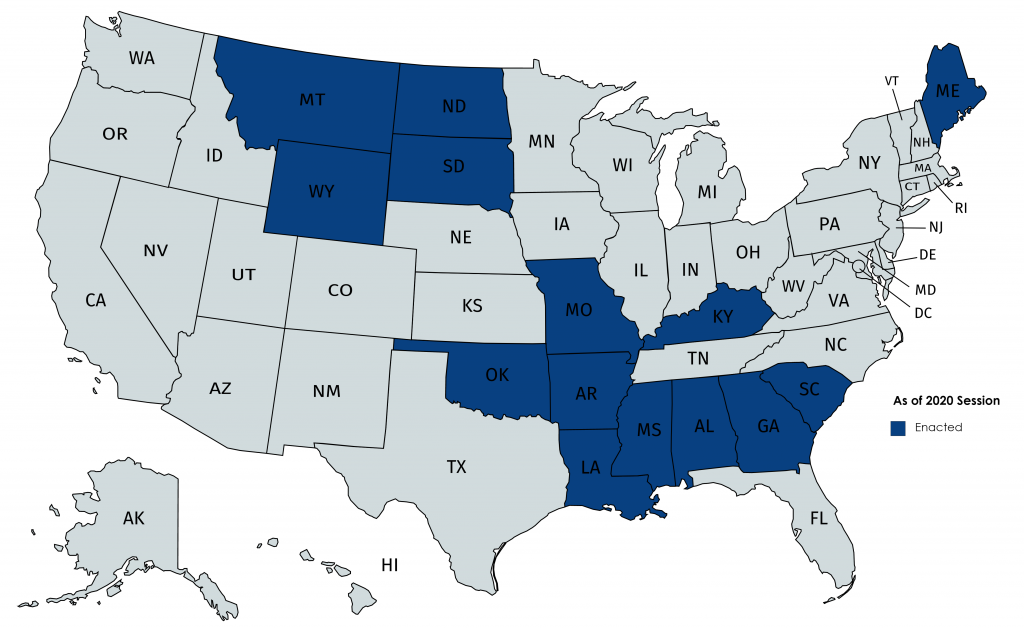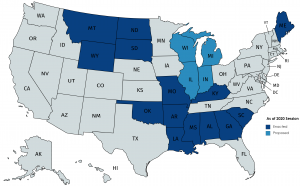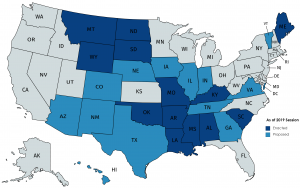The past calendar year has seen several developments in state laws governing the words or phrases that can be used to identify new-to-the-market protein products (plant-based, insect-based or cell-cultured). A few of those states have also include language limiting the types of products that may bear the word “rice” on the label. This wave of recent state legislation has brought a substantial amount of attention to this issue. In general, the statutes focus almost exclusively on meat labeling with the exceptions of Arkansas and Louisiana which also include rice. Challenges to the laws have been filed in five states so far, resulting in similar legislation slowing in other states. On the federal level, The REAL Meat Act of 2019 is still in active legislation. The following article will serve as an update on the status of the current lawsuits in Missouri, Arkansas, Mississippi, Louisiana and Oklahoma.
Missouri Turtle Island Foods, SPC v. Richardson – Denial of Preliminary Injunction on Appeal
Turtle Island Foods (Tofurkey) and the Good Food Institute brought an action in the Western District Court of Missouri against all of Missouri’s Prosecuting Attorneys seeking a preliminary injunction to stop the enforcement of the Missouri labeling statute. In line with other meat-labeling statutes, Mo. Rev. Stat. §265.494(7) prohibits the misrepresentation of a product as “meat” if the product does not come from “harvested production livestock or poultry.” Producers that violate the statute could face up to one year in prison as well as a fine of $1,000.00.
In order to obtain a preliminary injunction, the plaintiffs needed to show a likelihood of success on the merits of the case, irreparable injury is likely without a preliminary injunction, a preliminary injunction is fair, and a preliminary injunction serves the public interest. The plaintiffs were unsuccessful however, and the Court ultimately denied the preliminary injunction, allowing prosecution under the contested portions of the labeling statute. The Court determined that the plaintiffs were unlikely to succeed on the First Amendment Claim because “the statute only prohibits companies from misleading consumers into believing that a product is meat from livestock when it is, in fact, plant-based or lab-grown.” The plaintiffs, specifically the American Civil Liberties Union of Missouri (ACLU) on behalf of Tofurky, appealed the denial of the preliminary injunction to the Eighth Circuit Court of Appeals. During oral arguments before the Eighth Circuit, the state differentiated the Missouri statute from the Arkansas statute, where a preliminary injunction was granted, because Missouri’s statute banned “misrepresenting” products as meat while the Arkansas statute banned “representing” products as meat. Oral arguments were held on November 19, 2020. The district court case is currently stayed pending the Eighth Circuit’s decision on the preliminary injunction.
Arkansas – Turtle Island Foods SPC v. Soman – Appeal of grant of preliminary injunction
On March 18, 2019, Arkansas passed “an act to require truth in labeling of agricultural products that are edible by humans.” The stated purpose of the act is to “protect consumers from being misled or confused by false or misleading labeling of agricultural products that are edible by humans.” Notably, Arkansas defines “beef” “meat” “livestock” “pork” “poultry” and “rice.” Arkansas specifically noted that “meat” does not include “(i) synthetic product derived from a plant, insect, or other source; or (ii) product grown in a laboratory from animal cells.” Arkansas Act 501 also imposes a civil penalty not to exceed $1,000 for each violation. The law went into effect on July 23, 2019.
The Arkansas act has faced constitutional challenges. On July 22, 2019 Turtle Island Foods filed a complaint against Nikhil Soman, the Director of the Arkansas Bureau of Standards, alleging that “the act is a restriction on commercial speech that prevents companies from sharing truthful and non-misleading information about their products.” The complaint requested a preliminary injunction, which was granted as applied to Turtle Island Foods, on December 11, 2019. The injunction prevents the state from enforcing the six challenged sections of the act against Turtle Island Foods. The court stated that “Tofurky’s products … comply with federal food labeling regulations as well as numerous state and federal laws that prohibit false and deceptive labeling and marketing for food products…” The district court identified several deceptive labeling laws, including the FDCA, which had not been enforced against Tofurkey. Therefore, the court reasoned that Tofurky had likely not represented their plant-based products as meat products and would likely achieve success on the merits of their case. Accordingly, the court granted the preliminary injunction. The preliminary injunction remains in effect until the court orders otherwise, and prevents the state of Arkansas from enforcing Ark. Code Ann. § 2-1-305 against Turtle Island Foods until the law’s constitutionality is resolved.
Mississippi – Upton’s Natural Co. v. Bryant – Settled
In Upton’s Natural Co. v. Bryant, plaintiffs Upton’s Natural Company and the Plant Based Foods Association brought a First Amendment action against the Mississippi Governor and the Commissioner of Agriculture and Commerce challenging the enactment of the state’s meat-labeling law. The plaintiffs’ complaint challenges Mississippi Code Ann. § 75-35-15, which would ban terms such as “vegan burger” and “meatless steaks.” The statute in question prohibits labeling plant-based, insect-based or cell cultured tissue food products as meat or meat food product.
Both parties entered into settlement discussions shortly after the lawsuit was filed. In a November 7, 2019 press release, the Mississippi Department of Agriculture and Commerce announced that the lawsuit against the State had been withdrawn because of a newly issued regulation. In the release, the Commissioner stated that the plaintiffs had worked with the Department on the proposed rules which resulted in the plaintiffs dropping the case. The finalized regulation was issued that same day. The rule states that “a plant-based food products label shall not be false or misleading.” The regulation goes on to say that a plant-based product will not be considered meat if one of the following terms are displayed on the front of the packaging: meat free, meatless, plant-based, veggie-based, made from plants, vegetarian or vegan. While the Commissioner reiterated that the state law still remained intact, plant-based food producers are allowed to continue to advertise their products with terms from the approved list of qualifiers.
Louisiana – Turtle Island Foods (Tofurky Co.) v. Strain – Preliminary Injunction requested
In Turtle Island Foods (Tofurky Co.) v. Strain, Tofurkey Co. challenges the recently enacted Louisiana meat-labeling law. The law went into effect on October 1, 2020, and this lawsuit was filed less than a week later. Similar to other truth-in-labeling lawsuits filed by Tofurkey Co., the plaintiffs are alleging claims under both the First Amendment’s Freedom of Speech Clause and the Fourteenth Amendment’s Due Process Clause. If the law is upheld, the food producer could be fined $500 per day, per offense with its current marketing scheme.
In the complaint, the plaintiff contends that the law “prohibit[s] them from representing a food product as meat.” In addition, the law prohibits Tofurkey Co. from using phrases like “plant-based ham style roast” or “plant-based jumbo hot dogs.” The plaintiff also points out that there are currently federal laws that govern the deceptive labeling practices. The law is structured similar to Arkansas’s meat-labeling law, and includes products such as beef, pork, poultry, crawfish, shrimp, meat, sugar and rice. To comply, the food products must be harvested from an animal carcass, rice or unaltered plant-based sugar. The plaintiff is seeking a preliminary injunction as well as an order that declares the law unconstitutional. On November 3, 2020, the state Department of Agriculture informed the court that it will not enforce the law until the constitutional issue is resolved.
Oklahoma – Upton’s Naturals Co. v. Sitt – Preliminary Injunction Denied and Appealed
In Upton’s Naturals Co. v. Stitt, the Upton’s Naturals Company brought an action against both the Oklahoma Governor and the Oklahoma Agriculture Commissioner for the enactment of the state’s new truth-in-labeling law. Specifically, plaintiffs allege that the law violates the First and Fourteenth Amendments of the United States Constitution. Similar to other meat-labeling laws, Okla. Stat. Ann. tit. 2, § 5-107 prohibits the advertisement of “a product as meat that is not derived from harvested production livestock.” The law goes on to list products that should be considered “meat,” such as burgers, hot dogs and sausages. However, the law does include an exception for plant-based foods. Section 5-107(C)(1) says that “product packaging for plant-based items shall not be consider in violation of provisions of this paragraph so long as the packaging displays that the product is derived from plant-based sources in type that is uniform in size and prominence to the name of the product.” The plaintiffs contend that this type of disclaimer would be expensive and lead to consumer confusion. If found in violation of the law, plaintiffs could face fines up to $10,000.00 per offense.
On November 19, 2020, the District Court issued an Order denying the plaintiff’s request for a preliminary injunction. The Court stated that “it [had] no trouble finding that the speech at issue is potentially misleading.” It specifically referenced Upton Natural’s “Classic Burger,” a plant-based food product. The Court said that this meat-related term “indicat[ed] a traditional food made of beef.” The Court went on to explain that the “deception from the use of meat-related terms for plant-based products is self-evident from the natural inference a consumer would draw from the meat-related terms…” The Court wrote that the disclaimer requirement was “reasonably related to the state’s interest.” Within a week of the order, the plaintiffs filed a notice of their intent to file an appeal regarding the denial of the preliminary injunction.
Three of the lawsuits are at the preliminary injunction stage, yet all have had vastly different outcomes. A key note is that the main plaintiffs in these lawsuits are either Upton’s Naturals Foods, or Turtle Island Foods. The Arkansas court found the labeling on Tofurky’s packaging not misleading and therefore granted the preliminary injunction based on the likelihood of Tofuky’s success. In Oklahoma the judge specifically disagreed with the Arkansas judge in a footnote, stating that when viewed as a whole, the modifier of “VEGAN” and “100% VEGAN” were misleading when paired with “real meat” terms. The Missouri court denied the preliminary injunction because the judge found the language on the alternative meat product was not misleading and permitted under the law. These varying outcomes at the preliminary injunction stage showcase the differences in these laws and the difficulties that courts have when interpreting them. As a result, several states with pending legislative actions regarding meat labeling have abandoned their efforts. (Click maps for larger view). Pending the appeals of the injunctions and federal legislation, this area of the law will likely continue to be a divisive issue.
To view the NALC’s February 2020 Webinar on meat labeling, click here.
To view the NALC’s November 2019 post on meat labeling, click here.
To view a list of enacted laws regarding meat labeling, click here.
To view a list of proposed laws regarding meat labeling, click here.
*all map charts created with https://mapchart.net


